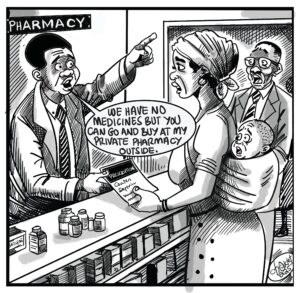FORMER justice minister Wynter Kabimba says some of the judges’ profiles and biodata presented to the select committee of Parliament are a big joke because they don’t say anything about a particular individual.
And Kabimba says most successful lawyers opt not to become judges because they make more money.
In an interview, Thursday, Kabimba agreed with constitutional lawyer John Sangwa’s suggestion that there should be a more rigorous criteria for selecting judges, observing that some of the information currently provided on candidates was irrelevant.
“I have seen here, I saw it even when I was minister of justice. When you look at the profiles and the biodata of judges that go to the select committee of Parliament, they are a big joke. They don’t tell you anything about that individual. Just look at them, take interest, there is something like name, date of birth, whatever. ‘The candidate has been cleared by security services and he has been at the bar for the last 10, 12 years’ because the 10 years is the minimum. ‘He has three children’, as if the number of children has anything to do with the judgement [they] should deliver. And it ends just there. Just about one page. If it goes beyond one page, you are lucky,” he said.
And Kabimba said most successful lawyers did not want to become judges because they were making more money and had more freedom.
“Lawyers now apply to become judges. So now, when you want to become a judge, you apply. I can tell you that very few lawyers want to become judges, especially the successful ones. They do not want to become judges because you are making more money and you have more freedom than when you become a judge. When you become a judge, your movements are restricted; you are restricted in terms of who you meet because every time you are under that spotlight. If you value your freedom, you don’t want to become a judge at the age of 40 and live under that spotlight for 30 years. So that is the problem,” Kabimba said.
“South Africans went further than that. They will advertise, you apply and then you are vetted by the people. There is a public hearing, so they ask questions and if they know that you do not have a credible background, and you don’t have integrity to discharge the functions of the judge, they will say it publicly. You know what that does, it makes people exercise self-censorship. You don’t want to expose yourself to the public when you know you have got skeletons in your cupboard. You will be scared.”
Kabimba agreed with Sangwa’s proposal to advertise the chief justice position but said it lacked supporting legal provisions at the moment.
“I agree with John entirely except that he is trying to make a proposal which is not yet backed by law. So the principle is good but it lacks supporting legal provisions. I heard him argue during a public forum or lecture that you organized and I think it was an acknowledgment on his part that we can wait until we have the legal provisions in place. What we need in our country are major and fundamental legal reforms. That is what we need,” he said.
“If you look at countries like the UK for example, they have legal reforms or commissions, almost every six months. We have not had any legal reforms in this country since independence apart from attempts to amend the constitution. But those amendments of the constitution have hardly trickled down to subsidiary legislation in any fundamental way. So what has happened in other jurisdictions is that they have realized that judges like any other people that occupy constitutional positions must be accountable to the people. That is the principle that John is trying to promote.”
Kabimba said there was need for reforms in the justice system which should cover the correctional services, the police as well as human rights.
“So I agree with John that it is high time we attended to this issue but we can only do so if we have major legal reforms and that’s what I tried to do when I was minister of justice. We actually established a legal ad justice reform commission under the chairmanship of former Supreme Court judge Fredrick Chomba. We gave them offices, premises to operate from. They took over some of the infrastructure that was left by the technical committee on drafting the constitution,” said Kabimba.
“The Idea was to make sure that we have broader reforms that cover the judiciary, the correctional services, and the police. These three arenas work in tandem. What do they do? When I was dismissed from the government, they threw away that commission and in its place, they appointed a commission to determine violence and tribal voting. It’s ridiculous. So in terms of priorities, we don’t know how to set our priorities as a nation. My view is that it is high time we had in place reforms in our justice system which should cover the correctional services, which should cover the police, which should cover the area of human rights. Only then are we going to find the correct answers.”


















